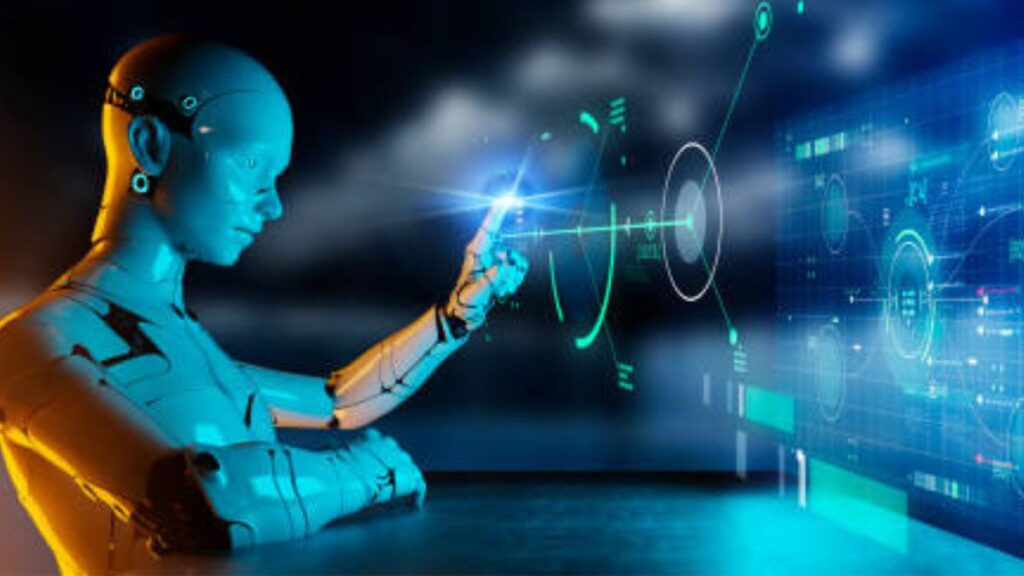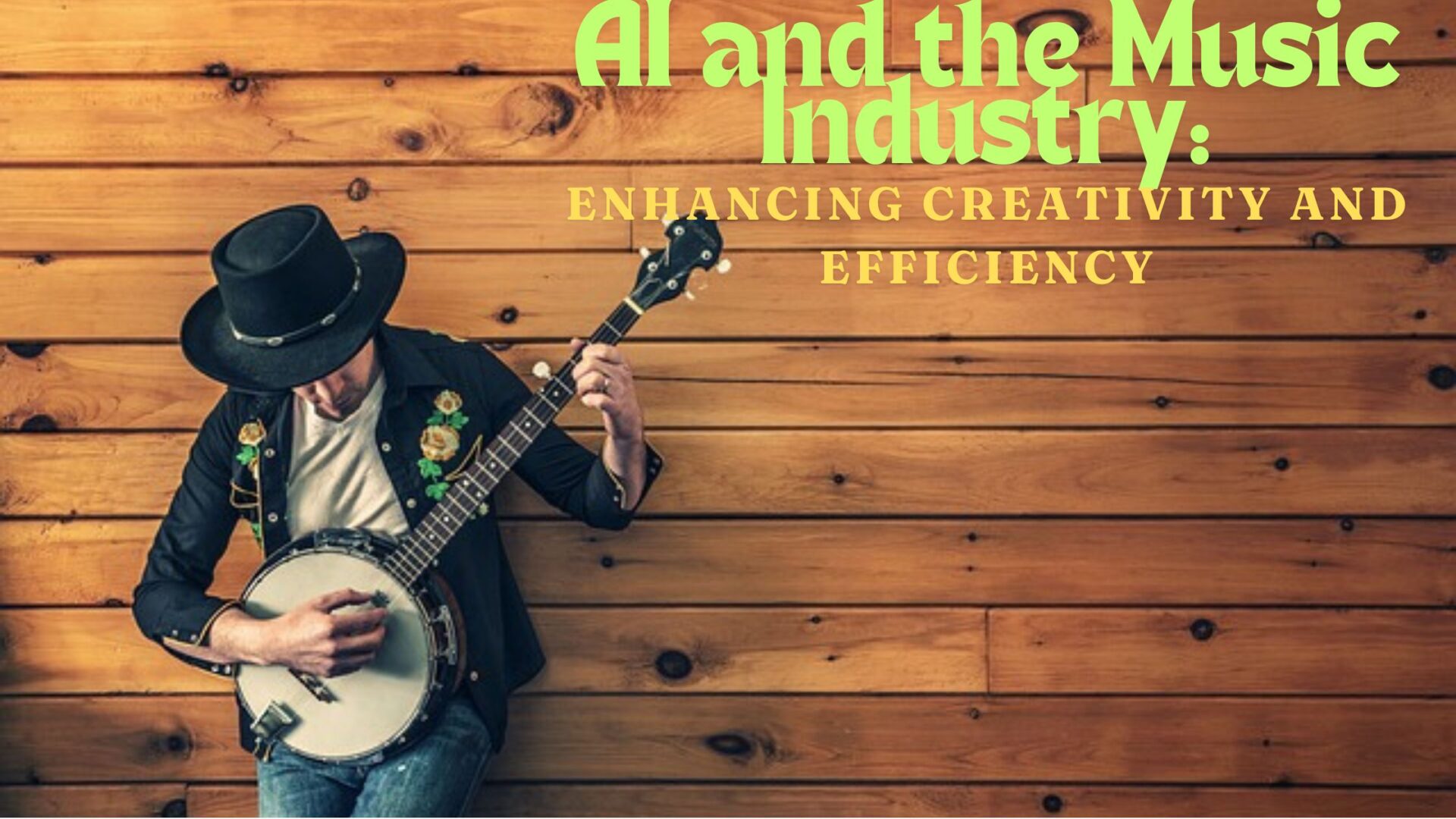Introduction:-
AI and the Music Industry: Enhancing Creativity and Efficiency

In the confluence of artificial intelligence (AI) and the music industry, a realm of unprecedented potential has emerged. From streamlining production workflows to unlocking novel avenues for artistic expression, AI is revolutionizing the way music is crafted, promoted, and experienced. This article delves into the diverse applications of AI in the music industry, highlighting its impact on both creativity and efficiency.
AI and the Music Industry
Revolutionizing Music Creation with AI-Powered Tools
In today’s digital age, artificial intelligence (AI) is transforming the music industry. AI-powered tools are now capable of composing original music and writing lyrics, offering musicians new avenues for collaboration and creativity.
AI Composers and Songwriters
Companies like OpenAI and Amper Music have developed groundbreaking algorithms that can generate unique compositions in various genres. These tools act as collaborative partners, providing artists with a foundation on which to build and refine their work. For example, OpenAI’s MuseNet can mimic the styles of renowned composers like Mozart and modern artists like Lady Gaga, opening up new possibilities for experimentation and accelerating the creative process.
Personalized Music Creation
AI enables unprecedented personalization in music creation. Platforms like AIVA (Artificial Intelligence Virtual Artist) can tailor compositions to the specific tastes and requirements of individual users, whether it’s for personal enjoyment, advertising, or film scoring. This level of customization allows for a more intimate connection between the music and the listener.
Enhanced Production Efficiency
Automated Mixing and Mastering
AI-driven tools like LANDR and iZotope’s Ozone employ machine learning algorithms to streamline the mixing and mastering processes. These tools analyze tracks and apply professional-grade adjustments, ensuring the highest audio quality. By automating these time-consuming tasks, AI makes high-quality production accessible to independent artists and small studios.
Intelligent Music Distribution
AI is revolutionizing the way music is distributed and marketed. Algorithms can analyze listening habits and preferences to recommend new tracks to users, increasing discoverability for emerging artists. Platforms like Spotify and Apple Music leverage AI to curate personalized playlists, enhancing user experience and driving engagement.
New Insights for Music Analysis
Audience Insights and Feedback
AI tools can analyze vast amounts of data from social media, streaming platforms, and other sources to provide artists and producers with valuable insights into audience preferences and trends. This data-driven approach informs decision-making, allowing artists to fine-tune their work and marketing strategies to resonate with their audience more effectively.
Predictive Analytics
AI-powered predictive analytics can forecast trends and predict the success of new releases. By analyzing historical data, AI can help record labels and artists identify potential hits and optimize release schedules, reducing risk and maximizing the potential for commercial success.
Ethical Considerations
While AI offers numerous benefits, it also raises ethical concerns and challenges. Issues such as potential copyright infringement, job displacement in the music industry, and the authenticity of AI-generated music are subjects of ongoing debate. It is essential for the industry to address these concerns and establish guidelines for the responsible and ethical use of AI in music.
How does AI help in mixing and mastering music?
The application of AI in the mixing and mastering of music has revolutionized the creative process. Here are the key ways AI contributes to the workflow:

1. Automated Mixing
- AI analyzes audio tracks, applying appropriate levels, panning, and effects.
- This includes balancing levels, EQ adjustments, and compression.
2. Mastering Assistance
- AI assists in the final stage of production.
- Tasks include loudness normalization, EQ adjustments, stereo enhancement, and limiting.
3. Sound Design and Effects
- AI suggests or applies creative effects such as reverb, delay, and modulation.
- This saves time and inspires new musical directions.
4. Analyzing and Imitating Styles
- AI can analyze reference tracks, applying similar mixing and mastering techniques.
- This helps achieve a desired sound quickly.
5. Time Savings
- Automating routine tasks allows producers to focus on creative aspects.
6. Accessibility
- AI-powered tools make professional-level mixing and mastering more accessible.
Popular AI Tools
- iZotope Ozone: AI-powered mastering suite with automated suggestions.
- LANDR: Online mastering service using AI for quick and efficient mastering.
- Neutron: iZotope product assists with AI-driven mixing, offering intelligent suggestions.
Advantages
- Consistency across tracks and projects.
- Significantly reduced mixing and mastering time.
- Real-time feedback and suggestions help beginners learn mixing and mastering principles.
Limitations
- Technical tasks handled by AI may not align with a producer’s creative vision.
- Over-reliance on AI may stifle learning and development of manual mixing and mastering skills.
In conclusion, AI in mixing and mastering music enhances efficiency, provides high-quality results, and serves as a valuable assistant. However, human touch is still necessary for creativity and final decisions.
What are some popular AI tools for music creation?
AI’s impact on music creation has been significant, revolutionizing the creative process and streamlining production. Here are some notable AI tools that have gained popularity:

1. Amper Music:
- AI-powered music composition tool.
- Features: Customizable compositions, real-time adjustments, royalty-free music creation.
2. AIVA (Artificial Intelligence Virtual Artist):
- Composes classical and various genre music.
- Features: Composition in different styles, DAW integration, score and MIDI file creation.
3. OpenAI’s MuseNet:
- Generates 4-minute musical compositions with 10 instruments.
- Features: Versatile style combinations, multi-instrumental compositions, user input for creative direction.
4. Jukedeck:
- AI music creation platform now part of TikTok.
- Features: Customizable music parameters, genre and mood selection, user-friendly interface.
5. Endlesss:
- Collaborative music-making app combining live looping and social platform.
- Features: Real-time collaboration, intuitive loop-based composition, community-driven music creation.
6. Magenta Studio by Google:
- Music plugins built on Google’s Magenta open-source research project.
- Features: Plugins for generating melodies, harmonies, and interpolations, DAW integration, open-source accessibility.
7. Melodyne:
- Advanced algorithms for pitch correction and time stretching.
- Features: Pitch correction, note detection, sound design capabilities, DAW integration.
8. Humtap:
- AI-powered app for creating music using voice or tapping.
- Features: Voice-to-music conversion, rhythm creation through tapping, user-friendly interface.
9. LANDR:
- AI mastering service offering AI-assisted music creation tools.
- Features: Automated mastering, collaboration tools, sample packs, and loops.
10. Amadeus Code:
– AI songwriting assistant for generating melodies and chord progressions.
– Features: Songwriting suggestions, melody generation, chord progressions, mobile device integration.
Advantages of AI in Music Creation:
- Inspiration: Provides new ideas and creative directions.
- Efficiency: Automates repetitive tasks, speeding up production.
- Accessibility: Makes music creation accessible to those without extensive musical training.
- Collaboration: Facilitates real-time collaboration, even remotely.
Challenges:
- Originality: AI-generated music may lack emotional depth and originality.
- Over-Reliance: Musicians may become overly dependent on AI tools, hindering creativity and skill development.
- Quality Control: Human oversight is necessary to ensure artistic standards are met.
These AI tools offer a range of functionalities, making them valuable assets for both amateur and professional musicians, enhancing creativity, and streamlining the music production process.
What are the ethical concerns of AI in music?
The integration of AI in music brings about several ethical concerns, which can significantly impact artists, the music industry, and society as a whole. Here are some key ethical considerations:

Ethical Considerations in AI-Generated Music
- Copyright and Intellectual Property:
- Originality and authorship: Determining the ownership of AI-generated music can be complex, involving programmers, users, and the AI itself.
- Plagiarism: AI systems trained on existing music may unintentionally reproduce copyrighted works, leading to legal disputes.
- Job Displacement:
- Impact on musicians: As AI becomes more adept at creating music, there is concern about reduced opportunities for human musicians, composers, and producers.
- Industry shifts: Traditional roles within the music industry may change, potentially marginalizing those who rely on music creation for their livelihood.
- Cultural and Artistic Value:
- Homogenization: AI-generated music may lead to a homogenization of musical styles, favoring popular trends and reducing diversity.
- Authenticity: The emotional and human aspects of music, crucial for its meaningfulness, may be diluted in AI-generated compositions.
- Bias and Representation:
- Data bias: AI systems trained on existing music databases may inherit and perpetuate biases present in the data, such as underrepresentation of certain genres or cultures.
- Creative diversity: AI could reinforce existing industry biases, favoring mainstream genres over niche or culturally diverse music.
- Transparency and Accountability:
- Algorithmic opacity: The decision-making processes of AI in music creation are often opaque, making it difficult to understand creative choices.
- Accountability: When AI generates controversial or inappropriate content, determining responsibility can be challenging.
- Economic Inequality:
- Access to technology: Disparities in access to AI music tools may widen the gap between well-funded artists and independent or emerging musicians.
- Monetization: Ensuring fair compensation for artists whose works are used to train AI systems remains a concern.
- Ethical Use and Consent:
- Use of data: Musicians and artists should consent to their works being used to train AI systems. Unauthorized use can violate intellectual property rights.
- Misuse: AI-generated music could be used inappropriately, such as generating offensive or culturally insensitive content.
- Emotional Impact:
- Emotional authenticity: AI may lack the ability to convey the emotional depth that human composers can, affecting the listener’s experience.
- Human connection: The connection between artist and audience may be weakened if music is perceived as created by a machine rather than a human being.
Addressing Ethical Concerns:
- Clear regulations: Establishing legal frameworks that address ownership, copyright, and fair use in AI-generated music.
- Transparency: Ensuring transparency in AI training and creative decision-making processes.
- Inclusive data: Using diverse and representative datasets to avoid perpetuating biases.
- Ethical design: Developing AI tools with ethical considerations, prioritizing fair use, consent, and the preservation of human artistry.
The ethical concerns surrounding AI-generated music underscore the need for careful consideration and proactive measures to ensure its benefits for artists and society while mitigating potential harm.
Conclusion
Undoubtedly, AI is revolutionizing the music industry, unlocking previously unimaginable possibilities for enhanced creativity and efficiency. From automating production processes to AI-powered composition tools and personalized music experiences, the scope of AI’s impact is vast and ever-expanding. However, as the technology advances, it is crucial for musicians, producers, and industry stakeholders to embrace these advancements while simultaneously addressing the accompanying challenges. By doing so, they can harness the full potential of AI to transform the music landscape and drive innovation.
References
- OpenAI. (n.d.). MuseNet. Retrieved from https://openai.com/research/musenet
- Amper Music. (n.d.). AI Music Composition. Retrieved from https://www.ampermusic.com/
- AIVA. (n.d.). The AI Composer. Retrieved from https://www.aiva.ai/
- LANDR. (n.d.). AI Mastering. Retrieved from https://www.landr.com/
- iZotope. (n.d.). Ozone. Retrieved from https://www.izotope.com/en/products/ozone.html
- Spotify. (n.d.). Personalized Playlists. Retrieved from https://www.spotify.com/
- Apple Music. (n.d.). Personalized Recommendations. Retrieved from https://www.apple.com/apple-music/
By leveraging these resources and understanding the impact of AI on the music industry, stakeholders can better navigate and thrive in this evolving landscape.
